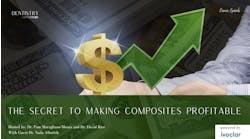We ask two experts the same question to give you two different answers on a complex issue
QUESTION
"Why should I pay a fee for a practice valuation when many brokers offer a free valuation?"
Peter Ackerman, CPA
As practices have increased in size, so, too, have their values. A dental practice is typically a dentist's single largest investment asset, which necessitates an accurate appraisal by an experienced financial professional.
Rule-of-thumb valuations were developed many decades ago as a simplistic way of measuring the value of intangible assets. During this time in the profession, advisors joked that dentists made great livings despite themselves. Being poor business operators and investors was a part of the profession. These rule-of-thumb methodologies are wildly inaccurate and are used today as a "free valuation."
Today dentists are faced with staggering student debt, increased competition, and reduced fee pressures. Making poor financial decisions is no longer practicable. The stakes are too high; dentists can no longer afford to make major financial decisions based upon simplistic and inaccurate valuations.
RELATED | What is a thorough valuation of a dental practice?
The appraisal methods used today are sophisticated financial models designed to measure a practice's investment value. Capitalization of earnings, discounted cash flows, market analysis, and asset valuation are often the most widely accepted approaches. By short-cutting the valuation of what is often the largest single-investment decision a dentist will make in his or her career, it is a roll of the dice with regard to a practice owner's financial success or failure.
Peter J. Ackerman, CPA, is a principal ofADS Midwest, a firm that provides practice brokerage, appraisal, and consulting services to dentists and related specialists throughout the Midwest, and past president of ADS. He can be reached at [email protected] or call (855) 463-0101.
Tom Snyder, DMD, MBA
It always astounds me how many doctors are unwilling to pay a fee for a professionally prepared practice valuation in order to determine the market value of their practice. Are those same dentists willing to provide complimentary X-rays and oral exams to gain a new patient? Only a few, in my opinion. Sometimes brokers minimize the importance of a comprehensive practice valuation and just offer the doctor a number that they feel their prospective client's practice is worth. Some brokers offer these free practice valuations in order to gain a listing and overpromise the proposed value based on a rule-of-thumb valuation. These free appraisals are not prepared following professional business and dental practice valuation standards. For example, these standards require that the recommended market value includes substantiation as to how that value was determined. Also regarding free appraisals, there is no fiduciary accountability to just provide an unsubstantiated value. If an individual has not paid for the service requested (i.e., practice valuation), someone cannot be held responsible for his or her "free advice." Properly prepared valuations typically include several valuation methods including a market approach, asset approach, and/or income approach. Free valuations do not include this substantiation. It is surprising to me that a dentist would want his or her No. 1 asset valued using a simplified, rule-of-thumb approach. Comprehensive dental practice valuation takes time (typically 10 hours or more) to carefully analyze all aspects of a very comprehensive small business. Investing a minimal amount for a properly prepared and calculated business valuation to determine what is best for your future seems a small price to pay when considering one of your most valuable assets. "Free" means you get what you pay for.
RELATED | ADA offers two new resources on practice valuation and associateships
Tom Snyder, DMD, MBA, is the director of transition services for the Snyder Group, a division ofHenry Schein Professional Practice Transitions. He can be reached at (800) 988-5674 or [email protected].
Past DE Articles







